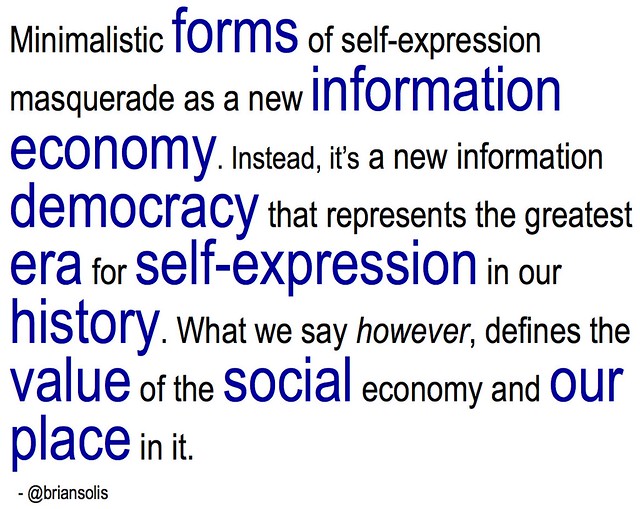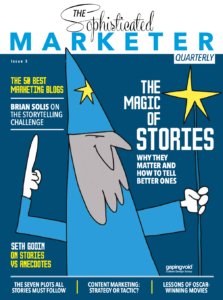Minimalistic forms of self-expression masquerade as a new information economy. Instead, it’s a new information democracy that represents the greatest era for self-expression in history. What we say, however, defines the value of the social economy and our place in it.
If we are defined by our actions and words, essentially the currencies we exchange, the question is, are we investing in our social capital or social arbitrage?
Connect with Brian Solis on Twitter, LinkedIn, Facebook
![]()
___
If you’re looking for a way to FIND answers in social media, consider Engage!: It will help…

___
Get The Conversation Prism:







Individually, I don’t agree that what we say defines our the value and our place in the social economy. Not completely anyway; it’s not the whole truth and possibly not the most important part of the truth. How we say what we say, and who’s willing to listen are, in my opinion, equally if not more important.
I do agree we’re defined by our actions and words. Whether we’re investing appropriately, or wisely, that’s a very good question. I find the answer elusive. Which is probably as it should be.
But the most important thing is having these discussions, and Brian, you’re as able a leader of such discussion as any. Thanks for posing these notions. Even when I don’t agree in detail, I always have to think for a bit why I don’t agree.
Hi Dave, the unfortunate reality that services like Klout and PeerIndex, at least on the social web, say otherwise. And, businesses are taking them for face value. Thank you for sharing your thoughts…keep it coming.
Darn. Klout *and* PeerIndex.
I definitely appreciate you keeping up with this stuff, it’s more than I have time (or interest, frankly) for. I read more than I comment, and definitely glad you have a mailing list.
I agree that what we say defines us in other peoples eyes. After all, they often have little else to judge us by these days, except for our written word.
So
It seems that whether we are investing in (presumably good and expansive) social capital or arbitrage (which is also a form of social capital) depends on context, one’s relative influence, and how one views the investment. If one’s social actions and expressions are disingenuous (even if persuasive–consider much of the media punditry) and look no further than to maximize the narrow interests of one’s tightly bonded peer group, at the expense of the larger social sphere, then our words and actions amount to arbitrage, gaming (and maiming) the system for personal gain.
By contrast, if actions and words aim at balancing personal interest with common cause, seeking a whole that is greater than the sum of the parts, which ultimately improves the lot of everyone, then we have real, positive, bridging social capital.
It’s this potential for a multiplicity of honest voices and perspectives that offer the potential for a “new information democracy,” but that doesn’t make the social exchange any less a *real* economy, in which individual actors seek to maximize advantage. The real matter is how broadly these actors conceive their sphere of affiliation and responsibility. Arguably, the more broadly, inclusively, and empathetically, the better.)
we would see that our time (defined by any number of tablet manufactures) would yield a great deal of insight.
Thanks for posing these notions. Even when I don’t agree in detail, I always have to think for a bit why I don’t agree.